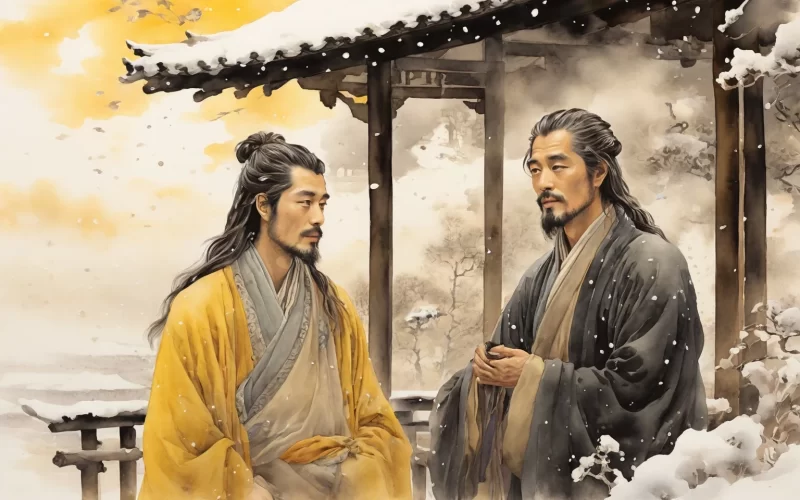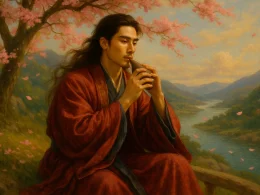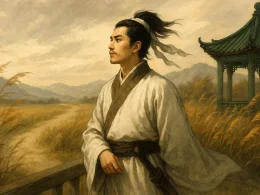Gao Shi (高适), 706 - 765 AD, was a native of Jing County, Hebei Province. In his early years, his family was poor, and he was disappointed in his career. He was famous for his border poems, which are not only numerous and wide in subject matter, but also present a unique style and perspective.
Gao Shi lived during the flourishing High Tang period, a time marked by national strength and cultural vibrancy. The era’s openness and frontier expansion provided intellectuals with opportunities to excel, shaping Gao Shi’s bold character and his distinctive style of frontier poetry. However, his early career was fraught with difficulties and prolonged wanderings. These hardships tempered his resilience and deepened his understanding of societal realities, which became central to his poetic themes.
Major works
Main experiences
1. Journey to Chang’an and the Northern Expedition to Yan and Zhao (722–733)
Gao Shi was born into a once-prominent official family. His grandfather, Gao Kan, was a renowned general during Emperor Gaozong’s reign, holding the rank of Left General of the Guard and titled Duke of Pingyuan. However, by the time Gao Shi came of age, the family’s fortunes had declined significantly. In his youth, Gao Shi was ambitious and confident in his literary talent, aspiring to achieve high-ranking positions and make significant contributions to the state. As a young man, he resided in Songzhou (modern Shangqiu, Henan), where he immersed himself in studying literature and military strategy, full of youthful vigor. At the age of 20, he embarked on a journey westward to Chang’an, hoping to gain favor with influential figures and secure a recommendation to the emperor. However, this ambitious plan ended in disappointment, marking his first major setback in pursuing an official career.
After his failed attempt in Chang’an, Gao Shi returned to Songzhou. Unwilling to abandon his dreams, he endured years of obscurity, dedicating himself to studying classics and history, with a particular focus on governance and statecraft. Ten years later, in 731, he traveled north to the regions of Yan and Zhao, seeking opportunities to join the military and advance through service. During this time, he visited key frontier locations such as Youzhou and Jimen. Despite frequent Khitan incursions and the urgent need for capable personnel on the borders, Gao Shi failed to secure a position. These repeated disappointments gave him a deeper understanding of the harsh realities of society. During this period, he wrote numerous poems reflecting on these experiences, establishing a heroic and somber tone that became characteristic of his work.
2. Sojourn in Qi and Song and Travels through Qilu (734–748)
After failing to secure a position in the northern frontiers, Gao Shi chose to temporarily retreat to the banks of the Qi River. This period of seclusion allowed him to observe the lives of ordinary people and the hardships faced by the lower classes. Although he appeared to be farming in seclusion, his heart remained filled with ambition. He attempted to seek an official position through the "Special Examinations" (directly supervised by the emperor), but these efforts also failed to yield results. During this time, he composed many poems expressing his frustrations about unfulfilled ambitions and the challenges of reclusion, such as Parting from My Retreat on the Qi River (Qi Shang Bie Ye).
After his time by the Qi River, Gao Shi began traveling extensively through the regions of Qi and Lu. During these travels, he interacted with scholars and the common people alike, and his poetry increasingly reflected social realities, expressing profound sympathy for the suffering of farmers. He not only connected natural disasters with societal hardships but also highlighted deeper social issues such as excessive taxation. This period marked a shift in his poetic style, which became more grounded, sincere, and empathetic, laying the foundation for the mature style of his later works.
3. Expeditions to the Frontier and Flourishing of Frontier Poetry (749–753)
Starting from the late Kaiyuan era, Gao Shi finally found a suitable path for his career by joining military staffs on the frontier. From 748 to 753, he participated in three major expeditions to the frontier, traveling to regions such as Youzhou, Qingyi Army, and the Hexi Corridor. These experiences gave him firsthand knowledge of frontier life, including military realities, the hardships of soldiers, and the complexities of military strategy. This period marked the peak of his frontier poetry.
During his first expedition, Gao Shi witnessed the urgent threats posed by frequent border conflicts in Youzhou and Jimen. He composed works such as Five Poems from Jimen (Jimen Wushou), which reflected the tensions of the frontier, the emotions of soldiers, and his dissatisfaction with incompetent military leadership. His second expedition focused on observing troop deployments, revealing the strained relations between soldiers and civilians while expressing his own aspirations to defend the frontier. During his third expedition, Gao Shi joined the staff of General Geshu Han, producing more impassioned frontier poems, such as Song of Yan (Yan Ge Xing), which revealed his yearning for military achievements.
4. Late Career and Facing Harsh Realities (753–765)
In 753, Gao Shi was finally recommended by General Geshu Han and appointed as an administrative official, marking a new chapter in his career. He gradually rose through the ranks, eventually serving as Minister of Rites. However, his later career was fraught with challenges. During the An Lushan Rebellion, Gao Shi, though holding a high position, personally experienced the suffering and chaos of war. During this time, his poetry matured further, combining sharp social commentary with unyielding vigor, as seen in works like Written in Fengqiu (Fengqiu Zuo).
After years of navigating the ups and downs of official life, Gao Shi’s later works reflected both a keen observation of societal realities and poignant reflections on his own unfulfilled ambitions. With profound emotion and historical insight, Gao Shi made an irreplaceable contribution to the development of Tang frontier poetry.
Literary Achievements
1. Mastery in Frontier Poetry
Gao Shi, alongside Wang Changling and Cen Shen, is celebrated as one of the "Three Masters of Frontier Poetry" during the Tang Dynasty.
- Diverse Themes: His frontier poems explore a wide range of subjects, from the harsh landscapes of the frontier to the daily struggles of soldiers, from the intricacies of military strategies to reflections on patriotism. For example, his "Five Poems on Ji Gate" vividly depicts the desolation of borderlands and the hardships of war, while "Song of Yan" expresses the poignant emotions of unfulfilled ambitions among soldiers.
- Distinctive Style: Unlike the elegance of Wang Changling or the imaginative brilliance of Cen Shen, Gao Shi's frontier poetry stands out for its heroic vigor, broad vision, and strong sense of realism. His works resonate with genuine empathy for the lives of soldiers and a profound understanding of the societal impacts of war.
- Artistic Excellence: Gao Shi's poetic artistry lies in his ability to capture powerful contrasts and evoke deep emotions through detailed imagery and poignant language. For instance, in "Song of Yan", the line "Half of the soldiers die on the battlefield, while courtesans sing and dance in tents" starkly contrasts the misery of the soldiers with the indifference of their commanders, creating a powerful critique.
2. Poignant Elegies and Personal Reflections
Gao Shi's lyrical poems express his struggles with unfulfilled ambitions, his reflections on life, and his loyalty to moral principles.
- Lamentations of Career Difficulties: Poems such as "Farewell to Dong Da" reveal his complex emotions of concern for his friends and uncertainty about the future, reflecting his frustrations on the arduous path of pursuing an official career.
- Commitment to Ideals: Despite setbacks, Gao Shi remained steadfast in his pursuit of moral values and loyalty. Poems like "Leaving East Ping for Lord Cao" express his unwavering dedication to integrity and justice, underscoring his noble character.
3. Realistic Portrayal of Society
Gao Shi's poetry, whether frontier-themed or introspective, often delves into the realities of Tang society.
- Voicing the Suffering of the People: Drawing from his personal experiences, Gao Shi vividly portrays the plight of soldiers and civilians affected by border wars. His "Five Poems on Ji Gate" captures the vulnerability of soldiers and the desolation of frontier life.
- Exposing Social Contradictions: Through sharp contrasts, Gao Shi critiques the extravagance and apathy of the ruling class. For example, "Song of Yan" juxtaposes the suffering of front-line soldiers with the carefree revelry of those in power, highlighting systemic inequalities.
4. Majestic and Accessible Poetic Style
- Distinctive Style: Gao Shi's poetry is noted for its grand and heroic tone, straightforward yet impactful language, and profound emotional depth. His works appeal to both the literati and common people, striking a balance between elegance and accessibility.
- Narrative Techniques: Gao Shi excels in blending vivid imagery with storytelling, as seen in "Farewell to Dong Da". The poem, though concise, conveys rich emotions and creates a vivid narrative picture.
5. Influence on Later Literature
- Advancing Frontier Poetry: Gao Shi not only continued the tradition of frontier-themed poetry but also enriched it with deeper social and emotional insights, inspiring later poets to explore similar themes.
- Fostering Realism in Literature: Gao Shi’s works exemplify the realistic spirit of Tang poetry, influencing poets like Bai Juyi and Du Fu. His focus on the hardships of the lower classes opened new avenues for Tang literary expression.
6. Artistic Brilliance in Representative Works
Several of Gao Shi’s masterpieces have become timeless classics:
- "Song of Yan": Often regarded as a pinnacle of Tang seven-character poems, it blends heroic sentiment with sharp social commentary.
- "Farewell to Dong Da": This concise yet deeply emotional poem has resonated with readers for centuries.
- "Composed at Fengqiu": A poignant reflection of Gao Shi’s solitude and resignation in his later years.
Gao Shi's poetic legacy lies in his vibrant frontier poetry and emotionally rich elegies. His works not only celebrate the heroic spirit of Tang soldiers but also critique societal injustices with profound empathy and realism. Gao Shi’s straightforward yet powerful language, coupled with his narrative depth, secured his place as a literary giant in Chinese classical poetry. His poetry, blending artistic excellence with heartfelt realism, remains an enduring treasure of Chinese literature.
















